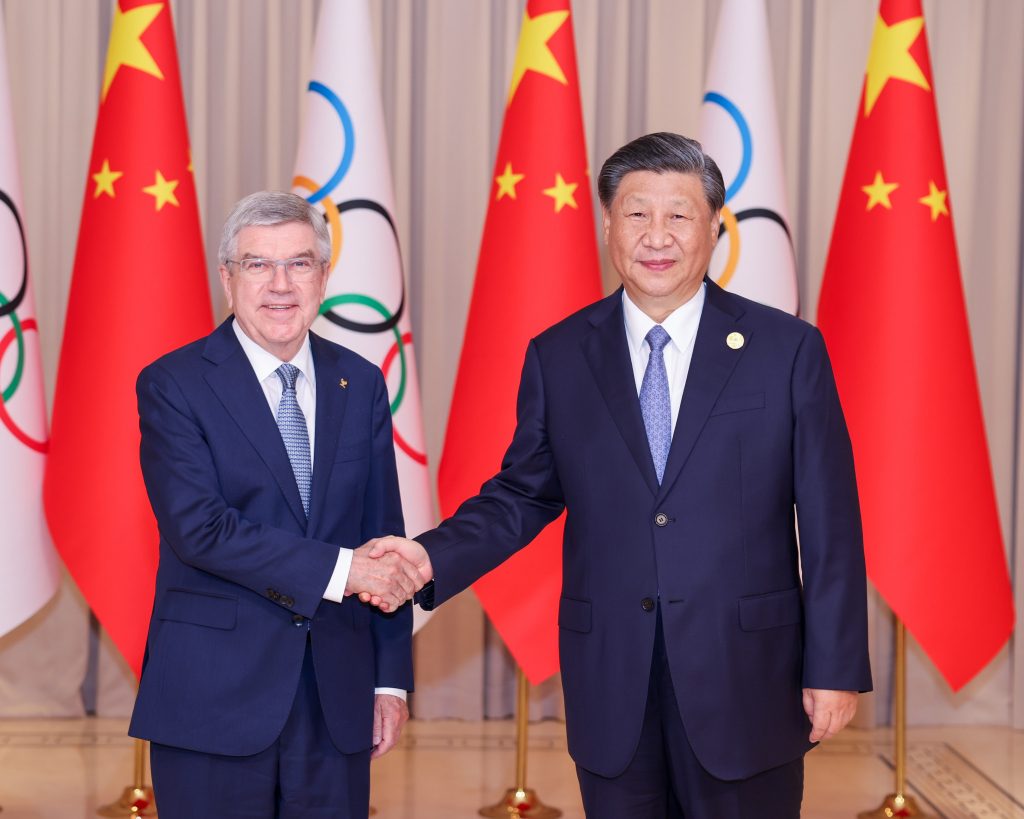When China’s President Xi Jinping told the International Olympic Committee chief Thomas Bach in Hangzhou a day before the opening ceremony of the ongoing Asian Games in Hangzhou, China that he vowed to uphold the principle of “non-politicisation of sports,” it was the height of hypocrisy, at least from India’s perspective. China, under his leadership, has done just the opposite. It has weaponised the Asian Games to needle and provoke India challenging the latter’s territorial sovereignty. His comments came within hours of a diplomatic row breaking out over the inability of three Indian athletes to attend the Games because of visa issues. The three female martial arts athletes are from Arunachal Pradesh which Beijing claims as Zangnan, or South Tibet.
As if taking a cue from the top, a Chinese foreign ministry spokeswoman indulged in diplomatic duplicity and equivocation by asserting that her country welcomed athletes from all countries “with valid legal documents.” This means Beijing did not recognise the Indian passports that the three Indian WuShu (a martial art) participants from Arunachal Pradesh possess. The three — Nyeman Wangsu, Onilu Tega and Mepung Lamgu — were given the accreditation needed to travel along with the rest of the Indian team for the Games. But seemingly following a directive issued to the airline by China, the athletes were not allowed to board their flight. China has been continuing with a policy of issuing stapled visas to Indians from Arunachal Pradesh to send the message that it does not recognise the Indian state which it claims to be its own province. Incidentally, only in this July, three WuShu players from Arunachal Pradesh, due to take part in the World University Games in Chengdu, were issued stapled visas. In the present case the decision to debar the three athletes appears even more vindictive since visas are not needed to travel for athletes given digital accreditations.
India construed the Chinese decision as a “targeted and pre-meditated” act. This is all the worse since in February last year, Beijing sought to rub India the wrong way by selecting the People’s Liberation Army’s commander involved in the Galwan Valley clash between Indian and Chinese soldiers, in which 20 Indian soldiers were killed, as one of the torchbearers for the Winter Olympics.
Understandably the organisers of the events – then and now – tried to gloss over China’s patently political and uncalled for actions as they appear to be powerless to take on China, given its status as a willing host and strong financial backer of such international sports events.
The acting President of the Olympic Council of Asia, Randhir Singh, who met President Xi in Hangzhou, took a meek stand as he told the media that India’s matter was being discussed instead of slamming the denial of entry to the athletes outright. Singh’s remark is understandable and he need not be condemned for it. He is not a diplomat and is only the acting or In Charge President of the Olympic Council. Patriotism cannot and must not come into play when the concerned nation is incapable of handling issues through proper official or diplomatic channels. China is constantly in a mood to queer India’s pitch at every opportunity in Asia. It has successfully made India look as a helpless nation that can only raise dust internally with the cooperation of the home media but is afraid or incapable to withstand external pressure. A very similar bravado that was sought to be exhibited against Canada now seems to have back fired with the ‘Five Eyes’ countries coming out and owning up that the Canadian PM’s statement was based on intel reports from those allied countries.
The Chinese action however is a reflection of the current distrust in bilateral relations as much as the absence of adequate channels of communication to sort out thorny issues, including visas. India’s position that restoration of normal relations hinges on completing the disengagement process along the Line of Actual Control may have its justification. But, more than that India needs to show it is serious and resolute while dealing with China.
India’s protest in the form of sports minister Anurag Thakur’s cancellation of his visit to the Games was too little too late. The decision to send the remaining WuShu squad to take part in the games dilutes the protest and shows India accepts the treatment meted out to the three members of the team caught in the diplomatic cross-fire. Put simply, India could have called off its total participation in the Games and sent a strong message which it did not think fit to do. So the protest will obviously not even be noticed.
India’s response appears to be timid in the backdrop of China’s continuous attempts for the past few months to disrespect India’s territorial integrity. Earlier this year China ratcheted up tension by giving Chinese names to 11 locations in Arunachal Pradesh. Despite India’s posturing and denial, China’s repeated attempts to nibble into India’s territory in Ladakh or Arunachal Pradesh lay bare the nervousness of the current dispensation in Delhi when it comes to take on China head-on. All the brave talk seems to be just internal, nothing external.
